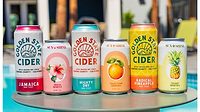Up Close With
Post Meridiem delivers authentic, bar-quality canned cocktails
Ready-to-drink cocktail brand taps third-party network for eCommerce retailing

Available in five varieties ― The Real Lime Juice Margarita, The Double Old Fashioned, The Lemongrass Vodka Gimlet, The 1944 Mai Tai and The No. Four Daiquiri ― Post Meridiem cocktails are crafted with the same ingredients that bartenders use.
Image courtesy of Post Meridiem Spirit Co.
American consumers seem to be having a love affair with ready-to-drink (RTD) cocktails. According to data from Chicago-based Information Resources Inc. (IRI), premixed cocktail dollar sales were up more than 62%, totaling $711.8 million, for the 52 weeks ending June 13 in total U.S. multi-outlets. Case sales also exhibited a strong performance being up 51.6% during this timeframe.
Members of the beverage community have taken notice of this impressive growth for this beverage alcohol segment.
“It’s no secret that RTD canned cocktails are the fastest growing alcohol category, and we’re optimistic the trend will continue,” says Andrew Rodbell, co-founder of Post Meridiem Spirit Co., Atlanta. “Five years ago, we could see that RTD consumption in the United States was three to four times lower than that of Europe and Asia, and we recognized the opportunity for the market. The U.S. RTD category is on track to catch up with the international markets, reaching the multi-billion-dollar sales projections that have been forecasted by industry experts.”
Rodbell notes that consumption of RTD beverage alcohol is being driven by many of the same trends impacting the overall beverage market such as convenience, authenticity, premiumization, as well as health and wellness.
“The category has also benefited from the rise in at-home drinking because of the pandemic,” he says. “Even as we return to normalcy, we don’t anticipate the adoption of RTD beverages to slow down, as on-premise venues are moving to low-labor solutions like RTDs, and consumers have discovered that pre-made drinks can be as good as bar-made drinks.”
Noting the segment’s elevated status with consumers, Rodbell highlights that Post Meridiem’s collection of canned cocktails is leading the charge.

Image courtesy of Post Meridiem Spirit Co.
Change instigator
Rodbell’s entry into the RTD canned cocktail venue is one not uncommon with today’s aspiring entrepreneurs.
“On a personal level, something was missing from my life in corporate America ― I wanted to build a new space and be a change instigator,” he says. “Around the same time, I attended a Yacht Rock Revue concert with an old friend of mine, Post Meridiem co-founder Charles Sain. The frustration of not having a well-crafted cocktail turned into a moment of inspiration. We began to form our vision for the company ― there’s no reason you can’t enjoy real ingredient, right-sized, full-strength cocktails wherever you are.”
Rodbell notes that the duo’s desire to produce quality, authentic ready-to-serve cocktails in a convenient format was a labor of love.
“Building Post Meridiem was hard ― we bucked industry trends at every turn ― from the commitment to using real ingredients to novel packaging and even self-manufacturing,” he says. “But we’ve maintained our focus of delivering the best tasting RTD cocktails anywhere. The result is that we made bartender-worthy, classic cocktails as accessible as beer and wine.”
Available in five varieties ― The Real Lime Juice Margarita, The Double Old Fashioned, The Lemongrass Vodka Gimlet, The 1944 Mai Tai and The No. Four Daiquiri ― Post Meridiem RTD cocktails are formulated to deliver on taste just like what consumers would find in a bar or make at home.
“Because we are committed to authenticity and do not engineer fake ingredients, we have limitations in a premixed format,” Rodbell says. “Some ingredients don’t have a suitable shelf life including grapefruit juice, lemon juice and vermouth. We had to shelve some of our favorite cocktails, like an Aviation or Manhattan, for example, because we refuse to compromise. We’re proud to showcase our commitment by prominently featuring the list of real ingredients and amounts on each can, a revolutionary tenet within the RTD space.”
Rodbell notes that the ascension for RTD cocktails with consumers opened the doors for Post Meridiem to deliver a fresh approach.
“Consumers are on a journey of maturation, moving first from beer to hard seltzers,” Rodbell says. “Now, consumers are on the move from malt-based seltzers to spirit-based RTDs, seeking more authenticity and great taste. When compared to other RTDs, Post Meridiem is the cutting edge of trends and the next step in the consumer beverage journey.”
However, ingredients are not the only way that Post Meridiem is keeping its products authentic. The brand’s package design also aligns with a traditional bartender crafted cocktail.
“If you go to your favorite bar, 100 ml (3.4 ounce) is the standard serving size for an Old Fashioned in a tumbler over ice or a Daiquiri in a coupe [glass],” Rodbell says. “We are simply taking bar-made cocktails and making them accessible anywhere, anytime.”
Although the reasoning behind the 100-ml can format was an easy choice for the brand, securing that package size required additional effort from the team.
“Using the right-sized 100-ml can was not easy,” Rodbell explains. “To make it possible, we built our own canning line. Self-manufacturing has many benefits, including the ability to make our cocktails without compromise, manage demand planning and control our supply chain. We are currently investing in a larger and faster canning line that will enable us to scale up much more rapidly.”
Designed for today’s shopping behaviors
With premixed packaged cocktails performing so well in traditional retail outlets, Post Meridiem has a healthy pipeline to consumers shopping these outlets in the states of Georgia, South Carolina, Tennessee, Maryland and Texas.
Rodbell notes that the company has more states in its horizon thanks to an upcoming partnership.
“We have a master service agreement with RNDC, one of the largest alcohol wholesalers in the U.S. spanning 33 states,” he says. “We are being strategic about our expansion, but it is rewarding to have best in class partnerships.”
However, true to form, Post Meridiem tapped into the lexicon of consumers’ shopping habits.
“We know consumer shopping behaviors are shifting, and we are glad to see regulatory changes that enable the alcohol industry to participate in eCommerce and delivery,” Rodbell says. “Traditional distribution and retail are our bread and butter, but we are excited to be available via new direct-to-consumer channels like eCommerce and delivery because our compact and sturdy packaging is very efficient to ship. [Direct-to-home] (DTH) also aligns well with our mission of providing bar-quality cocktails anywhere, anytime.”
Post Meridiem’s DTH delivery is in partnership with a network of third-party retailers that has brought the canned cocktails to more than 30 states, the company notes.
As Post Meridiem continues to mobilize its distribution force, it looks as though more consumers will be able to access bar-quality cocktails in their homes.
Looking for a reprint of this article?
From high-res PDFs to custom plaques, order your copy today!









